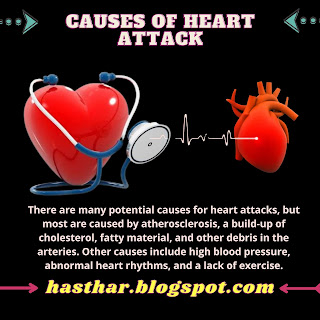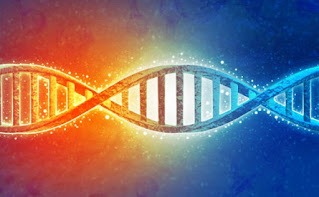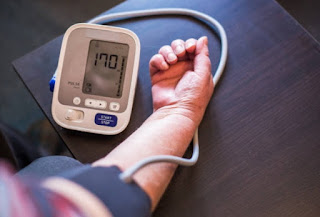Causes of Heart Attack
 |
| Causes of Heart Attack |
There are many potential causes for heart attacks, but most are caused by atherosclerosis, a build-up of cholesterol, fatty material, and other debris in the arteries. Other causes include high blood pressure, abnormal heart rhythms, and a lack of exercise. Let’s take a look at 10 of the most common causes of heart attack that you might not expect.
1.Smoking
Smoking is one of the biggest causes of heart attack. Every time you light up a cigarette, you are increasing your chances for a heart attack. It's never too late to quit smoking if you do! Look through our smoking cessation programmes to pick one that is right for you. People can quit forever if they take it one day at a time!
2.Diet
Diet is one of the leading causes of heart attacks. High cholesterol, high blood pressure, high triglycerides, and diabetes are all variables that raise your risk of a heart attack if you eat too much saturated fat and salt and not enough fibre. Weight gain may occur in those who do not receive enough exercise, which might exacerbate these issues.
3.Obesity
Obesity—which can be brought on by a wide range of factors from alcohol consumption to mental illness to genetics—is a leading cause of heart attack. In fact, researchers at Johns Hopkins University say that excess weight is one of four modifiable risk factors for heart disease, along with diabetes, high blood pressure and smoking. Having even a normal BMI can put you at risk.
4.Lack of Exercise
Too much junk food, not enough exercise and a lack of physical activity are three key contributors to heart attacks. Exercise helps keep your heart healthy, so if you’re not physically active, it’s time to make changes. Even if you already exercise regularly, adding more can do a lot for your cardiovascular health. Look for ways to fit in extra cardio workouts or pick up an activity that’s new to you—you might find that a new way to move is just what you need!
5.Genetics
Heart disease is an inherited condition. While you can’t catch heart disease from your friends or family, some people are born with a greater risk for developing it than others. Keep in mind that genetics do not automatically equal destiny—it just means that those who have close family members with heart disease are more likely to develop it themselves.
6.Metabolic Syndrome
Another common culprit is metabolic syndrome, an interrelated group of risk factors that raises heart disease risk. It increases blood pressure and insulin resistance as well as body fat and cholesterol levels, which in turn puts more stress on your heart. People with metabolic syndrome tend to have a larger waistline (more belly fat) and higher blood sugar levels than people without it, according to Mayo Clinic. If you think you may have metabolic syndrome, talk to your doctor or consult a professional nutritionist for help managing your condition.
7.High Blood Pressure
High blood pressure can contribute to clogged arteries and, therefore, a heart attack. When you have high blood pressure, your body has to work harder to pump blood throughout your body. This can put stress on your arteries, causing them to harden or clog. High blood pressure can also cause other health problems like stroke and kidney disease.
8.Stress
Though some stress is good for you, too much can hurt your heart. Stress raises your blood pressure and increases your risk for high cholesterol, which are two risk factors that may lead to a heart attack. Other causes of stress—like feeling lonely or struggling at work—can also trigger heart attacks in people who have other common heart disease risk factors. If you’re under more than usual physical or emotional stress, talk to your doctor about how you can manage it before it becomes a serious health issue.
9.Medications/Drugs
One of the most common causes of heart attack is medications. Even if your doctor prescribes a particular drug for you, he or she might not be aware that it can cause coronary issues if you have heart problems. So, let your doctor know about any and all drugs and supplements you’re taking so he or she can determine whether there’s a risk of medication-induced heart attack.
10.Family History
If you have a strong family history of heart attacks, then there’s a high chance that you may also be affected. It is estimated that 70 percent of cardiac events occur in people with known risk factors. Those who can’t control their cholesterol levels are particularly at risk. In fact, those who take up smoking and smoke over 15 cigarettes per day increase their chances by 50 percent!










Post a Comment